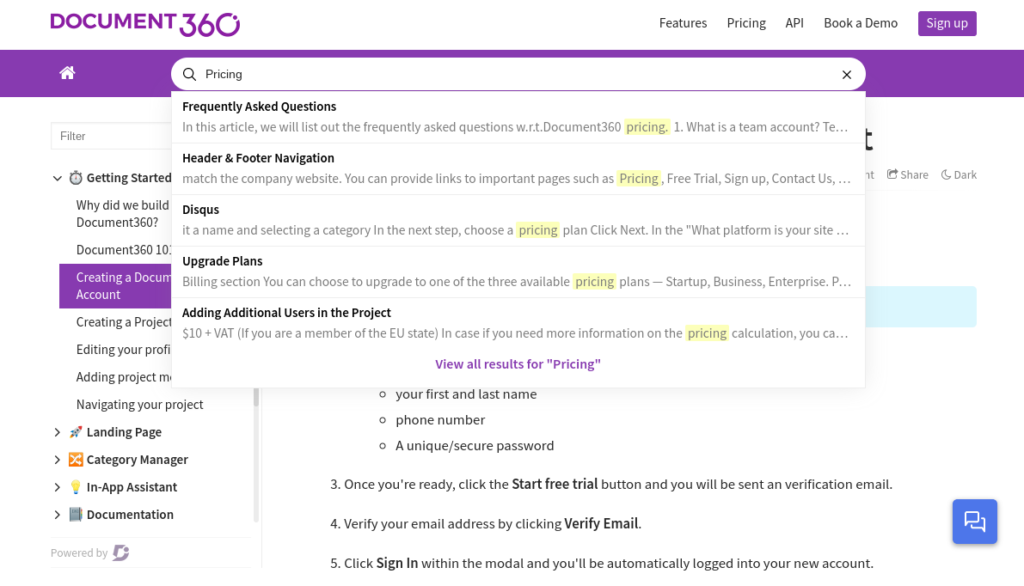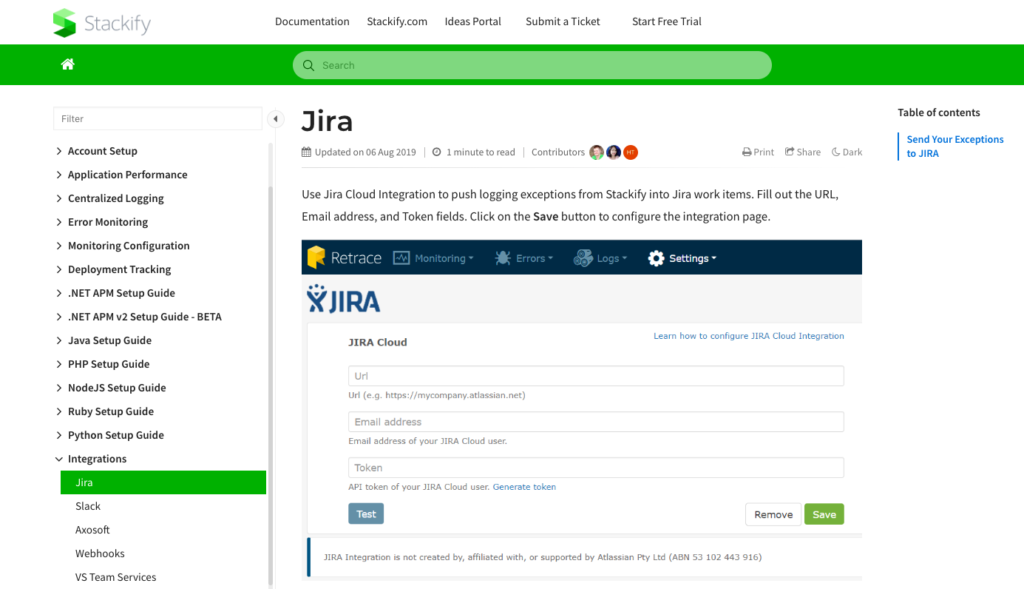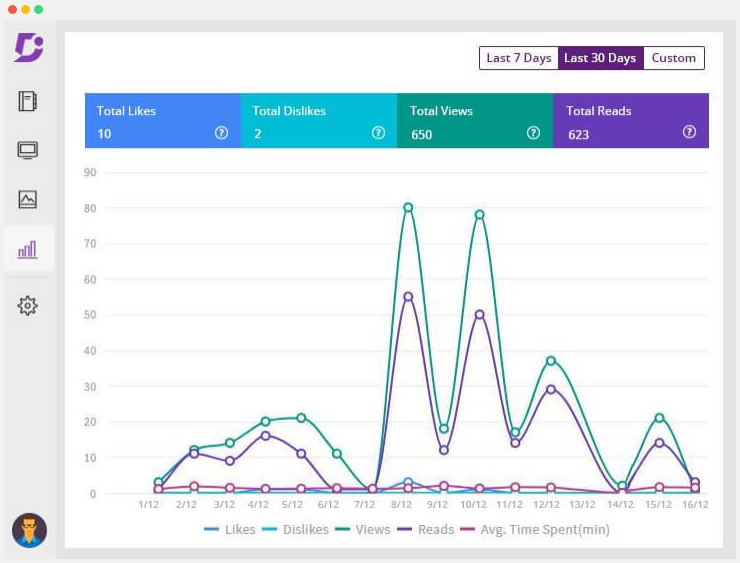If you run or work in a SaaS business, you may be well aware that the competition in your sector is getting harder and harder. With new SaaS products and services popping up around every corner, the need to keep your customer deeply engaged and highly satisfied has never been greater.
One way that leading SaaS have found a competitive advantage which has propelled their growth is through the use of knowledge base software.
Knowledge bases are increasingly popular add-ons to existing SaaS products and services. Not only do they help to improve the way internal teams share information effectively across the business, they empower customers to solve their own problems and become power users.
This is delivering short and long term benefits that drive growth, reduce customer churn and maximize revenue for SaaS companies.
In this post, we’ll explore the many reasons how knowledge base software can build efficiencies related to information sharing throughout your SaaS business and power long term customer growth.
Here’s a few things we’ll cover:
- Which type of knowledge base should your SaaS business use?
- How SaaS internal teams can use a knowledge base to operate more efficiently
- Fixing onboarding and activation with a knowledge base
- Using a knowledge base to reduce customer churn
- Reducing customer support queries with a knowledge base
- Discovering customer problems via search analytics
- How to power your content marketing with a knowledge base
- The hidden SEO benefits of knowledge base documentation
- Best practices of managing a SaaS knowledge base
What is a Knowledge Base?
Let’s start with the basics. What is a knowledge base and can it deliver such great benefits for your SaaS business?
A knowledge base platform is a self-service repository used to store easily retrievable information about a company’s products or services and customers. At its heart, it’s a collection of a business’s internal and external knowledge, structured in a way that can help both employees and customers find the information they need, when they need it.
By collecting, standardizing, organizing and managing information about your SaaS product or service, a knowledge base ensures information is easy to find and can be easily used by the right people, as and when required.
Choosing a SAAS Knowledge Base – Internal, External, or Hybrid?
When it comes to choosing a knowledge base for your SaaS businesses, there are typically 3 options available; an internal knowledge base, designed to be used by your internal team only, an external knowledge base that is customer facing, or a hybrid of the two.
Here are the benefits of each knowledge base category.
Internal Knowledge Base
- Ensures employees can search and find key information quickly, optimizing the customer support experience they deliver
- Helps upskill employees and provides individuals with autonomy over their own development
- Drives employee collaboration and knowledge sharing
External Knowledge Base
- Helps customers find the information they need on their own
- Assists with customer onboarding, maximizing customer retention rates after signup
- Reduces the support resources required to deliver customer satisfaction
- Enables customers to provide feedback directly into the asset
- Usage data helps identify and prioritize subject matters that are popular, offering opportunities to iterate and improve
Hybrid Knowledge Base
- Delivers value to customers and employees
- Can be used as a high value reference tool when delivering customer support
- Helps employees and customers align when discussing a particular topic
The type of knowledge base chosen is often dictated by the objectives a SaaS company is aiming to achieve.
If for example, the goal is to enhance and scale customer support to improve the experience and reduce churn, then an external knowledge base makes sense.
On the other hand, if the aim is to embrace knowledge sharing within your business then an internal knowledge base would be more beneficial.
Here’s a few use cases:
Objective |
Knowledge Base Type |
| Improve customer onboarding and activation | External or Hybrid |
| Educate customers on product features | External or Hybrid |
| Document continuous technical fixes | Internal |
| Reduce customer support enquiries/costs | External or Hybrid |
| Educate internal team on product offering | Internal or Hybrid |
| Provide secure information to a designated group of individuals | Internal |
How SAAS Teams Can Use an Internal Knowledge Base to Operate More Efficiently
There are many moving parts to a SaaS business and transparent information sharing amongst internal teams is a critical activity.
Technical teams need to document major changes to the product and be able to track the changes they are making in an effective manner. Product teams need to document new features and functionality. Marketing teams need to work with product teams to create documentation that is used to communicate with customers to explain how features work. And customer support teams need to work with everyone to ensure bugs are flagged and fixed, and customers get their problems solved quickly!
As you can see, good documentation is at the core of every sensible SaaS business, and an internal knowledge base is the perfect tool to bring it all together.
By having a central repository of all the valuable information relating to your SaaS business, immediate benefits are realised:
- Better Collaboration Amongst Teams – Improved information visibility enables in-house product, marketing, technical and support teams to work more collaboratively and ensure everyone is working towards the same common goal – growth!
- Consistent Product Information – SaaS products are constantly evolving and features are regularly updated which can make it challenging for everyone to maintain the same levels of product knowledge. A knowledge base gives everyone in the business a central place to find the very latest product documentation.
- Improved Employee Onboarding – As your SaaS business grows, new hires are inevitable. With a well documented knowledge base, new employees can hit the ground running by finding all the information they need about your product in one easily accessible repository.
- Minimising Risk of Knowledge Loss – In those early days of a SaaS business, you may find just a few members of the team hold the keys to some of the business critical information. Unless this information is well documented, you may find technical knowledge leaves your business overnight with no plan B in sight.
Using a Knowledge Base to Drive SAAS Customer Growth
Fixing SAAS Customer Onboarding and Activation
Once you’ve got the basis of your product documented internally, that becomes the foundation of your customer support information.
Empowering your customers with adequate information about your product or service is particularly important at the activation phase – a measure of how many users take a specific action to get value out of your product.
The activation phase of a customer’s experience with your software product is one of the most important to perfect, but also the hardest to facilitate.
This is why a good onboarding process is vital in a SaaS product. Most customers start with zero product knowledge and as a result they struggle to fully adopt and often cancel as a result.
75% of new SaaS customers leave a product within the first week. (Hubspot)
With such a high level of customer drop-out it’s clear, customers need more in order to effectively adopt a SaaS product.
This is where a good knowledge base comes in.
Drawing attention to useful product documentation within your knowledge base throughout the customer onboarding experience is your opportunity to explain common use cases for key features and how to get the most out of them.
If your customers can quickly and easily understand what they need to do and see the value of your product, the likelihood is that you’ll be able to keep them coming back for more.
How a Good Knowledge Base Reduces SAAS Customer Churn
As any SaaS founder knows, churn is one of the more unavoidable aspects of running a SaaS business.
There will always be customers that don’t make it past their free trial period, cancel their monthly subscription or simply can’t see the value of the features of the product or service in the long term.
According to Lincoln Murphy at Sixteen Ventures:
…an acceptable churn rate is in the 5 – 7% range ANNUALLY, depending upon whether you measure customers or revenue.
So how can a knowledge base reduce churn?
By empowering customers to find critical information as and when they need it, a knowledge base helps them to make the most of the service and its features. This ensures they’re getting maximum value for money and seeing the full benefits of the platform, maximizing their satisfaction and minimizing their chance of dropping out.
The more you invest in supporting your customer’s understanding of your product or service, the greater the chance they will become a true advocate of it.
This can turn regular users of your product into ‘superusers’ – individuals who’ll not only know your product inside and out, they’ll be the first to want to test ride new features, flag bugs they spot and proactively share your product to their own wider network – completely free!
Reducing SAAS Customer Support Queries With a Knowledge Base
Providing Self-Service Customer Support
If reducing churn is your focus, then your SaaS business needs to be well on top of it’s customer support right from the off.
In principle, well designed software should equate to less customer support issues. That’s the theory but not everyone is tech savvy and many of your customers will need to contact support to help them solve the challenges they have using your product.
If you’ve got a large customer base, this may mean you require large amounts of resources to effectively communicate and resolve challenges. This can be costly and in many instances frustrating when the questions brought to customer support are often repeated again and again.
Only slightly more than 10% of consumers are willing to stay on the line for over five minutes for customer service. (Genesys)
To combat these inefficiencies, a knowledge base can be used to solve the majority of common challenges, enabling customers to help themselves, and reducing the need for human input.
This not only limits the time required to solve the problem, but ensures a 24/7 solution is available to resolve time-sensitive issues.
67% of customers prefer to self-serve over speaking to a company representative (Superoffice)
By enabling customers to help themselves, you can improve customer satisfaction and radically reduce support costs while providing a consistently high standard of customer service.
Read about more customer support benefits of a knowledge base here
Why Responsiveness Is Key for SAAS Customer Support
The modern day expectations of your customers have changed. It’s no longer acceptable to make them wait for a long time to get a problem solved.
SaaS companies that do not meet support expectations leave themselves vulnerable to much higher rates of churn, as customers will not stick around if the support experience is poor.
89% of consumers have switched to doing business with a competitor following a poor customer experience. (Nextiva)
In order to deliver the high quality SaaS customer experience necessary, it’s essential that the support team have access to the information they need so they can provide a valuable answer quickly.
With an easily searchable comprehensive knowledge base, customer support operatives can find and provide key information as and when required.
With a knowledge base like Document360, features like advanced search and category management help SaaS businesses organise information in logical ways so they can be grouped into topics and then found very quickly by customers.


For example, for a highly technical product like Stackify whose main customers are developers, they use category management to breakout the different ways the product can be integrated into other platforms.


This helps to direct customers to the right information quickly and efficiently without having to rely on customer support staff to do the same job.
Read our ultimate guide to SAAS customer support
Discovering SAAS Customer Support Issues With Search Analytics
When it comes to providing a high quality level of support for your customers, it’s important to cover all essential content topics and fundamentals.
To avoid a frustrating customer experience (and potential churn) the information customers are looking for needs to be easy to find and always available, as and when required.
The trouble is, it’s not always obvious what holes you have in your product documentation until you start hearing it directly from your support team in the form of customer problems and complaints.
This is where search analytics can play a strong role in helping your business discover areas of your product that aren’t quite up to scratch or are not easy enough to use.
By plugging in search analytics into your knowledge base, you’ll be able to use search query reports to monitor questions that are commonly asked, and also identify those that cannot be answered by the platform’s current resources.


This data-driven approach gives you the perfect insight into the holes that exist in your product and support documentation so you can fill them over time – improving your customer experience at the same time
Powering Your SAAS Content Marketing With a Knowledge Base
According to the Content Marketing Institute, 89% of B2B marketers use content marketing to grow their businesses.
The investment into blogging programmes, eBooks and whitepapers can be significant for SaaS companies with the goal of driving potential customers to their website and convert them to leads.
A knowledge base can go a long way to helping your SaaS business achieve some of the same objectives.
Growing Your Search Presence
The documentation that lives within your knowledge gets indexed by Google which means that it naturally brings potential customers to your website.
Knowledge base tools like Document360 have SEO features built directly into it to maximise the search potential of articles that are created.
Optimising article page titles, providing article tags and customizable images are all critical to making content easy to organise and find in the digital space. Such usability benefits are key for making the tool valuable for users of the knowledge base.
With these capabilities in-hand, marketers in your SaaS business can optimize the visibility of the knowledge base through SEO best practice, driving higher yields of organic traffic.
Of course your content doesn’t have to be solely limited to the questions about your product. You can provide documentation about questions potential customers may have before they even register their interest.
Undertaking some keyword research, you’ll be able to identify what these key questions are, and provide useful, informative and relevant content to attract new visitors and draw them into your registration funnel.
The Best Practices Behind Managing a SAAS Knowledge Base
Develop a Culture of Good Knowledge Management
In the world of SaaS, knowledge is power, and so it’s integral that information is effectively organized, captured, stored and managed. This is where knowledge management comes in.
Designed to optimize the value of internal information, knowledge management efforts typically help to generate competitive advantages, drive innovation, enhance performance and improve collaboration.
74% of businesses estimate that effective knowledge management disciplines increase company productivity by up to 40%. (AskSpoke)
Because SaaS products often iterate and evolve at a rapid rate, the information within them ages quickly and becomes less valuable.
As a result, product documentation needs to be regularly monitored and reviewed. It’s integral your knowledge base is accurate, particularly as the information held within may be shared with customers or used directly but support teams.
An outdated knowledge base is about as valuable as having no knowledge base at all. To get the most value out of it, it must be updated regularly to reflect the most current state of play.
Failure to update your knowledge base has the potential to frustrate customers looking for solutions to their problems and can lead to knowledge loss throughout your business if staff leave.
Consider Your Knowledge Base to Be a Live Asset and an ‘Open Resource’
By providing a single platform where knowledge can be effectively captured with easy-to-use templates, stored logically using category management features and edited to deliver optimal value, high quality knowledge management can be achieved.
SaaS companies often use knowledge base software in their knowledge management efforts to:
- Protect, record and store business-critical information, ensuring an unexpected brain drain or employee loss doesn’t impact the company’s ability to deliver its proposition.
- Improve team and employee alignment, driving enhanced collaboration, helping to identify and resolve challenges like unexpected customer churn.
- Enhance the user experience by improving the layout and hierarchy of information, making it easier to find and access.
Assign an Owner to Keep Your Knowledge Base to a High Standard
As the knowledge base is typically a substantial asset, it requires an owner from within your business to manage and organize.
This stakeholder will take responsibility for optimizing the platform, resolving issues and ensuring everything delivers maximum value.
Some businesses assign owners to different sections of the knowledge base that align with their expertise, others assign ownership based on the function, for example, an individual will be responsible for quality checking and moderating all content uploaded before it is published.
Irrespective of how responsibility is allocated, it is key that someone is responsible for each element of the knowledge base in order to avoid high-risk issues and take full advantage of opportunities as and when they arise.
Optimize and Expand Your Content Based on Usage Data
As your customers engage with content from your knowledge base, analytics will become available that indicates which topics areas are popular and deliver the most value.
Ensuring that you are providing the right level of depth on features and functionality will be clear based on the usage data that you get from your analytics.
55% of consumers say easy access to support and information can make them fall in love with a brand. (RightNow)
If you release a new feature and suddenly notice a spike in search queries, you’ll know immediately that you need to develop adequate content to support your customers to help them use it more effectively.
Improve Information Access to Enhance Customer Satisfaction and Drive Retention
For SaaS businesses, retention is a top priority, and so it’s integral every effort is made to keep customers satisfied at every stage of engagement.
This is where a knowledge base can help, by giving customers direct access to the information they need, as and when they need it, they can quickly solve their own problems and maximize the value they derive from the SaaS solution.
Loyal customers are 5x as likely to repurchase, 5x as likely to forgive, 4x as likely to refer, and 7x as likely to try a new offering. (Temkin Group)
Why SAAS Businesses Need a Knowledge Base
SaaS businesses like yours can take full advantage of the significant benefits on offer by using knowledge base software.
SaaS companies that do adopt a knowledge base and regularly iterate will quickly develop an asset that offers increasing value over time, helping combat churn rates and deliver higher quality customer support experiences. This will help drive customer satisfaction and bring new levels of scalability to support functions, maximizing customer satisfaction and reducing drop out from the offering.
Best-in-class SaaS businesses use a knowledge base platform both internally and externally, enabling customers and employees alike to take full advantage of the benefits it can offer.
This not only ensures customer satisfaction is maximized, but retention is protected and revenues optimized – enabling growth.
If you’re looking for a knowledge base designed specifically to meet the needs of SaaS companies and customers, then Document360 can help.
See the benefits for yourself, try the Document360 demo today.






